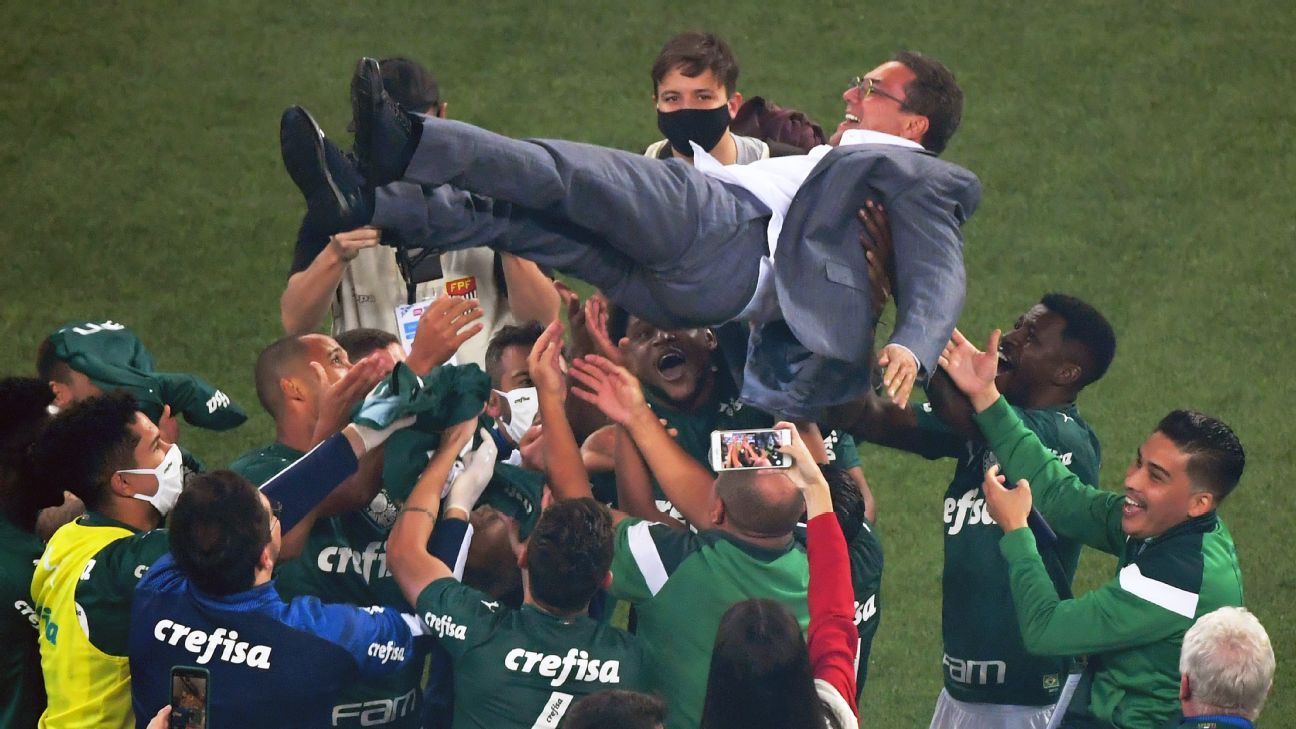Products You May Like
Former great Rivaldo took to social media on Saturday to declare that the best manager he ever worked with was Vanderlei Luxemburgo, who was his boss at Palmeiras and the Brazil national team. Another former FIFA world player of the year, Portugal icon Luis Figo, left a comment. As far as Figo was concerned, Luxemburgo was: “The worst coach. Really bad.”
The context is that Brazilian coaches are losing space. As the cream of the global game gather in Lisbon and in Germany for the closing stages of the European competitions, there are Brazilian players all over the place, but — yet again — no Brazilian coaches.
There is clearly no prejudice against South American coaches in the European game. Argentines such as Diego Simeone and Mauricio Pochettino have thrived. Even a Chilean without a world class playing career, Manuel Pellegrini, has been in charge of some of the biggest clubs around.
– Ronaldinho could be released from custody on Aug. 24
– Laurens: Will Thiago Silva leave PSG as a champion?
– Vickery: Gabriel Jesus slowly moving out of Ronaldo’s shadow
But there are no recent Brazilian success stories. Former left-back Sylvinho barely had time to get started with Lyon: He was sacked after a handful of games and the club, through to the quarterfinals of the Champions League, are unlikely to regret their ruthlessness. Luiz Felipe Scolari had an unsuccessful spell with Chelsea a few years ago, and Luxemburgo was at Real Madrid, where he did not last long and obviously failed to impress Figo.
So there is no significant European demand for Brazilian coaches, and increasingly Brazilian clubs are turning to foreigners to take charge of their players. This movement gained massive momentum with the success last year of Portugal’s Jorge Jesus in charge of Rio de Janeiro giants Flamengo, who he took to the national and South American titles. He has been replaced by a Spaniard, Pep Guardiola’s long term assistant and former boss of New York City FC Domenec Torrent. Less than a week into the job, Torrent got off to a losing start on Sunday with a 1-0 defeat to Atletico Mineiro, coached by the explosive, attack-minded Argentine Jorge Sampaoli.
The presence of so many foreign coaches is ruffling some feathers. Now back at Palmeiras, Luxemburgo stressed on Saturday that: “We don’t have to change our essence, with five World Cup wins, 11 club world titles and all the history of Brazilian football. Why should we change? Now that Jorge Jesus came and won the Libertadores, so we have to change?”
He is being disingenuous, as he surely is well aware. The story of Flamengo’s magical 2019 was by no means restricted to a question of what the team won. It was at least as much a case of how they did it.
With a high defensive line and the parts of the team sufficiently close for slick passing movements, Flamengo captivated with a swashbuckling spirit of attacking exuberance — something not seen on Brazilian fields for some time. As if to reinforce the point, Luxemburgo was speaking after his team had just won the Sao Paulo State Championship, on penalties, after two barely watchable games against old rivals Corinthians.
He is also being disingenuous because he is bright enough to be aware of the history. True, Brazilian coaches have historically been undervalued. When things have gone well, the credit usually goes only to the ability of the players. An important part of the truth gets forgotten; Brazil were pioneers of the back four. When they unleashed it in 1958, their first World Cup win, they did not concede a goal until the semifinal. And the wonderful 1970 team could be seen as a prototype of modern day 4-2-3-1.
These are colossal achievements in which foreign coaches played a huge part. Martin Francisco, seen as the inventor of 4-2-4, was assistant to the Uruguayan Ondino Viera, seen as a master strategist. And Vicente Feola, in charge in 1958, had worked with the great Hungarian Bela Guttman.
Moreover, there is something disingenuous about the victory roll to which Luxemburgo referred. Brazilian clubs may have won 11 world titles, but there has only been one in over a decade. Fair enough, it is not a level playing field when South America has to compete with the financial power of the European clubs.
But the same criteria is not applied to World Cup wins. Never mentioned is the fact that Brazil has the advantage of a huge population, and can call on immense footballing strength in depth. But the last triumph came in 2002. Since then, they have been eliminated by France, the Netherlands, Germany and Belgium — four countries whose combined populations do not come close to that of Brazil.
Resting on these laurels has clearly proved unwise for Brazilian coaches. The success of Jorge Jesus should have given them a wake up call. It will be fascinating to see how they respond.
